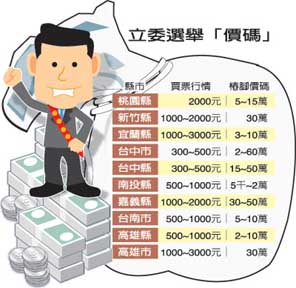
First, this is the first time that an SMS campaign has been mentioned as a factor. A number of people received SMS messages on their mobile telephones to vote for Regina Ip.

The assumption so far is that it must be coming from the supporters of Regina Ip. That is not certain. What is certain is that the impact of these SMS messages has been negative. This means that the SMS messages has the potential of becoming a negative campaigning tool -- just flood people's mobile telephones with crassly phrased messages purportedly from your opponent!People have reassured that these messages exist. But that is not the point. The point here is just who is sending those messages? Regina Ip's camp, or someone else? There is a recent American example: Who's Behind The Mystery Political Phone Spam? and Kafkaesque Political Phone Spam, Part II
The mystery in this case is that some auto-dialing service is calling apparently random people up in the middle of the night and spamming them with recorded 2008 presidential campaign speeches from both parties. Here are some comments:I received 3 calls from mitt romney, I am pissed he has burned up a total of 5 minutes on my 1 800 number, that I get billed for. He is not getting my vote, this is not my style of advertising. I started a thread about this in his forum feel free to tell him your thoughts http://www.mittromneyforum.com/showthread.php?p=190
This morning at 6:30, a recording of a speech by John Edwards from that same phone number.
There was no introduction or ID, just the mention of "wife, Elizabeth".
I know the call did not originate from Edwards, the caller just wants Edwards and the Democrat party to be perceived as an annoyance.
Yes, I am annoyed, but not at the Democrats!I got a call from this number on my business 1-800 number.
It was a speech by Hillary Clinton - over 4 minutes long and at 2:30 a.m. EST.
I will file a complaint with the FCC - thanks for the info.
[in translation]
... In order to sell the Taiwan referendum to join the United States, the Taiwan representative's office got the Heritage Foundation to hold a discussion forum on December 18. This is a fairly typical policy pitch and the Heritage Foundation chose a neutral subject title: Taiwan's United Nations Bid: Domestic Democracy of International Crisis? The invited speaker was the Taiwan representative Joseph Wu. Two discussion panel were to follow. The first one was to be chaired by Heritage Foundation senior research fellow John Tkacik Jr, with the panelists being former Deputy Assistant Secretary of State for East Asian and Pacific Affairs Randall G. Schriver and legal scholar professor Chen Lung-chu. The second one was to be chaired by Ambassador Harvey Feldman, with the panelists being Center for Strategic and International Studies' International Security Program senior associate Bonnie Glaser, American Institute in Taiwan director David Brown and Democratic Progressive Party's advisor Michael Fonte. Unfortunately, Taiwan's Government Information Office took out an advertisement in the Washington DC newspaper Politico beforehand and raised a storm for the meeting.
This full-page advertisement appeared on page 14 of the December 13 issue of Politico. The headline read: The Practical Imperative of UN Membership for Taiwan. This was accompanied by a photograph of President Chen Shui-bian and Vice-President Annette Lu holding up torches and jogging in front of the Presidential Office in October this year. There were four sections of texts that explained the reasons why Taiwan should be admitted into the United Nations. Further down is a photograph of a goldfish trapped in a fish bowl with the words 'End political apartheid' stamped across it. Two more lines of text read: "A vital life should not be limited, a democratic nation not isolated."
If this is all there is in that advertisement, outsiders would not have any problems. They might even say praise the advertisement for its attractiveness. The mistake was that the information about the meeting was printed in the bottom left corner of the advertisement. The meeting was labeled a discussion of Taiwan joining the United Nations, and the names of the organizers and speakers were also listed as if they were propagandizing for Taiwan's cause. "UN Membership for Taiwan" appeared in big letters at the bottom, with the URL: www.gio.gov.tw as if they needed to tell the world that this was propaganda paid for by the Taiwan government!
When the meeting began, Heritage Foundation's Asia Studies Center director Walter Lohman said that the advertisement was inappropriate and easily misunderstood. He said that although the Heritage Foundation is organizing this meeting, it held no position about either supporting or opposing Taiwan's entry into the United Nations. He said that the headlines, photographs and texts in the advertisements may cause people to think that the Heritage Foundation is propagandizing for the Taiwan government and therefore he had to speak out in order to dispel any such notion. At this time, word came that Bonnie Glaser had withdrawn from the meeting. Indeed, when the second session began, the chairman Feldman read a statement from Glaser to protest the Taiwan Government Information Office's advertisement which was the reason for her withdrawal.
What was the Government Information Office thinking when they took out that advertisement? Their decision-makers obviously misjudged the professionalism and judgment of American think tanks. Although the Heritage Foundation was asked by the Taiwan representative's office to hold this meeting, this isn't Taiwan and money isn't everything. While American think tanks hold different positions and beliefs, they are all required to have professionalism, independence and integrity because these are the bases by which they can exert their influence.
In the second session, Ambassador Harvey Feldman is a honorary research fellow of the Heritage Foundation and he was practically speaking on behalf of the foundation. He started by saying that if Taiwan wants to join the United Nations, it must have the consent of the UN Security Council. But China is a member of the UN Security Council and it will veto the motion (note: He asked all those present: Does anyone here think that China will not veto?). Not only that, but Russia and France will also veto. Therefore, the chances of Taiwan joining the United Nations is zero! If such is the case, then why bother holding a referendum? Not only that, Feldman re-read aloud the words of Deputy Assistant Secretary for East Asian and Pacific Affairs Thomas Christensen and said that he agreed with this position of the American government. He did so in order to prove that he was an independent expert just as the Heritage Foundation is an independent think tank, and neither will be influenced by the Taiwan sponsorship of this meeting.
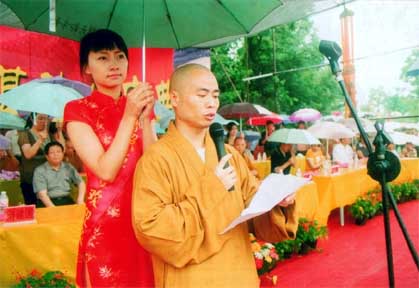
I’ve my reservation on those China hands, I wonder just how much do they truly understand China and Chinese, not just the ability to speak the language. Here are couple of excerpts from The Private Life of Chairman Mao by Dr. Li, to prove my point.
Page 120: Mao described himself best. I am heshang dasan, he told Edgar Snow in 1970, literally meaning “a monk holding an umbrella.” But heshang dasan is only the first half of a couplet. The second, most important and meaningful, half, wufa wutian – is always left unsaid. The sound wufa wutian, meaning ‘without hair, without sky,” is the same as an expression that means “without law, without god” – a man subject to the laws of neither man nor god. Mao’s interpreter that day was a young woman without a classical education, and she translated the Chairman’s self-description as “a lonely monk walking the world with a leaky umbrella.” Edgar Snow and numerous scholars after him concluded that Mao had a tragic, lonely view of himself. Nothing could have been further from the truth. Mao was trying to tell Edgar Snow that he was a god and law unto himself, wufa wutian.
From Pro States in Flames, here is part of the speech:
[in translation]
At the present, the Party Central Committee's concept of building a harmonious society is deeply popular among the people. Everybody wants to have a harmonious society. This is consistent with the Buddhist notion of 'blending.' We believe that under the leadership of Master Priest Zhengci, the Puzhao Temple will revive its past glory and make even greater contributions towards the development of religious affairs, the advancement of economic development and the construction of a harmonious society in our city of E'chou.

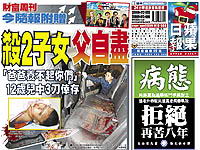



When I read today's front page in United Daily News, I had to say that I was "discomforted." I don't mean the report about the father who stabbed himself and his children, but I am referring to the KMT advertisement on the top left corner of the newspaper.
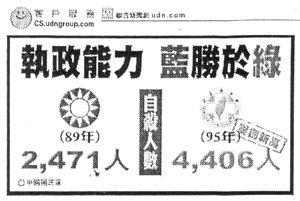
[translation: Governance: Blue is better than green. In 2000, there were 2,471 suicides when the KMT ruled; in 2006, there were 4,406 suicides when the DPP ruled (new historical high).]Previously, the KMT has a series of such advertisements about governance. In the previous three days, they focused on economic growth rate, unemployment rate and rich-poor gap. This is what the 'blue' camp is good at. The 'blue' camp want to talk about the economy whereas the 'green' camp want to talk about referenda. It makes sense for the KMT to use these statistics as their weapons.
But today's theme shocked me. The KMT brought up the number of suicides! ... The conclusion suggested by the KMT as that since the number of suicides went up during DPP rule, 'blue' must be better than 'green.'
I don't mind about wrangling between political parties, with occasional dirty tricks. These political risks are the crosses that the politicians must bear. But isn't it disrespectful to the dead to invoke their deaths as political weapons? While a frequent issue in Taiwan is the economy, did all 4,406 persons commit suicide due to the ineptitude of the DPP? Many of them were probably lovesick, or troubled by chronic illness. Should the deaths of these people be blamed on the DPP?
... I don't want to be a defender of the DPP. By my own reckoning, I lean towards 'blue.' But when the number of suicides is used for propaganda, how can that be described other than 'discomfiture' (plus 'bad taste')?
Houanling village, Tanghekou town, Huairou district, Beijing City is a small village with 187 persons living in 71 households. Recently, almost 20 of those households are about to have divorces. The key point is to note that when a married couple get divorced, the household is split into two households.
It has been known that the village party secretary and the village mayor do not get along. Their squabbles has split the villagers into one or the other camp. There is a new election for village representatives, of which 31 are supposed to be elected. The voters are the households (and not the individual people). The village is divided into three brigades. So far, the elections within the first two brigades have ended with 25 village representatives, of which two-thirds support the village mayor.
The election in the third brigade is about to be held, with 15 households participating. The balance of power was about the same between the village party secretary and the mayor. That was until the supporters of the party secretary decided to shift the balance by obtaining divorce. On December 12, a dozen or so villagers showed up at the Huairou district Civil Affairs Bureau to get quick divorces. Wen Haili said, "I'm getting divorced not because of emotional problems with my husband. We need to become separate households as quickly as possible for the election of village representatives." Liu Hanshen said: "I want to get a divorce and I also want my parents to get divorced. We are now two households. After the divorce, we will become four households." The divorcing villagers intend to get re-married after the election; however, they will not re-combine their household registration.
The origin of the concept was that the many of the married couples in the village had maintained separate household registrations. For example, the village mayor and his wife are married but are registered as two households. In his defense, the village mayor produced documentation that proved that their household registrations were made long before they were married. His wife was a widow, and she wanted to keep a separate household registration because she considered herself the proper wife of her first husband.
There does not appear much that the two government officials can do because everything is quite legal.
(SCMP) Democracy 'not' in pocket, warns Anson Chan. By Chris Yeung and Albert Wong. December 17, 2007.
...
Mrs Chan said the government has failed to give a convincing answer to why universal suffrage could not be held in 2012 although most people wanted it. Legco, she said, should back the majority view of society until it was proved no longer possible.
However, the convenor of the executive council, Leung Chun-ying, said during a Newsline programme, broadcast by ATV World last night, that the implementation of universal suffrage "isn't just a question of the preference of the Hong Kong people". Since democratic reforms needed the agreement of the chief executive, at least two-thirds of the Legislative Council, and the National People's Congress, "you need to find common ground", he said. Although he thought Hong Kong was ready for direct elections of the chief executive in 2012, when asked whether he thought he would see that happen, he replied: "I wouldn't bet on it".
A source in the pan-democratic camp said privately they were not optimistic the Standing Committee would give a clear timetable of universal suffrage for the chief executive in 2017. "Pan-democrats must set the record we are prepared to negotiate for a compromise. We have never said our position is kind of `2012 or nothing'. We may consider an interim electoral method that is fully undemocratic as long as there is an ultimate universal suffrage package with a timetable."
(Apple Daily) No timetable promised; not a single word on a roadmap; the pan-democrats will not compromise
[in translation] We interviewed Anson Chan and she said that the Chief Executive's constitutional development report did not promise that if universal suffrage could not be implemented in 2012, then it will happen in 2017; the report pointed out that more than half of the people of Hong Kong support double universal suffrage in 2012 but it did not offer any sufficient reason not to implement that in 2012. Therefore, the various sectors ought to continue to strive for double universal suffrage in 2012.
... A pan-democrat pointed out that every since the battle over the political reform package in 2005, the pan-democrats have requested to conduct official dialogue with the Chief Executive and the Central Government. At the time, Donald Tsang ignored them and the Central Government refused to hold discussions (except for some "unofficial" communication). The situation has not improved up to now.
A pan-democrat claimed that outsiders criticize the pan-democrats "opposing for the sake of opposing." In fact, it was the Central Government which refuses to communicate with the pan-democrats. In this Chief Executive's constitutional reform report, it was acknowledged that more than half of the people support double universal suffrage in 2012. The Central Government must respect public opinion and hold discussions with the pan-democrats in order to reach a consensus on the timetable and the roadmap.
What is the public opinion anyway? Here is the Hong Kong Research Association poll (caveat: unknown bias because this is a automated voice interviewing without control on respondent selection):
Q4. How shall universal suffrage for the Chief Executive proceed?
42%: 2012
30%: 2017 after a transitional period
24%: After 2017, after a transitional period
4%: No opinionQ5. Is it possible that 2/3 of the Legislative Council will pass the bill for 2012 universal suffrage for the Chief Executive?
25%: Yes
56%: No
19%: No opinionQ6. If 2012 universal suffrage for the Chief Executive cannot be achieved, do you accept 2017?
59%: Yes
25%: No
16%: No opinionQ7. How shall universal suffrage for the Legislative Council proceed?
36%: 2012
30%: 2016 in steps
28%: After 2016, in steps
6%: No opinionQ8. Is it possible that 2/3 of the Legislative Council will pass the bill for 2012 universal suffrage for the Legislative Council?
27%: Yes
51%: No
22%: No opinionQ9. If 2012 universal suffrage for the Chief Executive cannot be achieved, do you accept 2016?
57%: Yes
29%: No
14%: No opinionOn one side, the pan-democrats are citing the information in Q4 and A7 about the support for double universal suffrage in 2012. On the other side, the pro-establishment camp are referring to the information in Q6 and Q9; the 'reason' for the delay is due to Q5 and Q8. How do you write a timetable and roadmap given Q5 and Q8? The devil is in the details about how to get at least ten of the legislative councilors from the functional constituencies to vote themselves out of Legco.

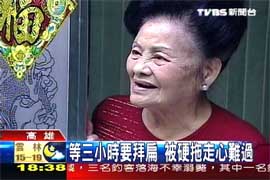
Feel
positive
towards
governmentFeel
negative
towards
governmentFeel
positive
towards
peopleFeel
negative
towards
peopleHong Kong 47% 9% 58% 5% Mainland 49% 12% 39% 16% Taiwan 10% 56% 40% 10% Macau 44% 14% 51% 3% Singapore 59% 7% 63% 3% Canada 45% 4% 52% 1% Australia 46% 4% 47% 3% Japan 17% 43% 46% 12% South Korea 39% 11% 45% 8% United Kingdom 38% 12% 45% 7% USA 16% 45% 41% 8% Thailand 20% 29% 40% 9% France 24% 7% 32% 7% Germany 26% 6% 31% 3% Italy 18% 6% 28% 4% Russia 17% 24% 26% 7%
(Wong Onyin's blog) The following is the translation of an essay by Lawrence Cheng.
The father of an 18-year-old young man died of cancer; his mother is mentally impaired; his sister is only 12 years old. Although he had applied for social welfare, he could not make enough to meet expenses. He found some work to earn money but the Social Welfare Department found out and withheld HKD 1,000 per month. This 18-year-old young man could not stand the pressure and committed suicide at home.
In this society, there is a standard formula poverty: When a family of three gets only HKD 8,600 per month, it is impoverished; when it gets more than HKD 10,000, it has left poverty behind. In the eyes of the Social Welfare Department, this was just another case. In my eyes, this is a human tragedy.
For this young man, his father passed away before he was 18 years old. Faced with this tragic loss, he took up the responsibility of caring for his mentally impaired mother and his young sister even though he was not yet mentally mature. Who was going to look after him? Did the relevant government departments ever reviewed his situation? Did they do anything special in view of his special situation? Instead, they took advantage of his misfortune and said: "Hey! I caught you! You are in big trouble!"
When I read this news story, it was the same time that Anson Chan joined the Legislative Council and Secretary Tsang took a shot at Mrs. Chan's sudden interest in democracy. The two sides almost got into a heated battle between detractors and defenders. Then Executive Council member Leung Chun-ying jumped out to discuss the relationship between democracy and livelihood. So they talk and talk and thereby revealed that they only know how to talk.
Dear respected Legco members and government high officials, just as you were speaking about democracy and livelihood, there is an old flat in Sham Shui Po in which an 18-year-old young man with no inking about democracy and livelihood ended his short and helpless life.
Right before Christmas, Donald "Bowtie" Tsang presented the political reform report to the National People's Congress. There is no need to discuss the contents of that report because the citizens and the Legco members already know it. However, each of them have to play their roles to the hilt. While the Legco members have to hold the high government officials to account, everything is scripted already. Sometimes, the script is "impractical" as when Mrs. Chan aid: "If the Chief Executive is unwilling to resent the mainstream opinion to the Central Government, we will request the Chief Executive to arrange for a direct dialogue with the Central Government, so that we can reflect the citizens' demand for double universal suffrage in 2012."
Sigh! There had been the July 1st march in 2003 and the Beijing grandpas were taken by surprise. As a result, they increased their efforts at monitoring public opinion. The grandpas have a better machinery at gathering "mainstream public opinion" than anyone else, and anyone involved in politics has to know that. If you really to "do something" and you are confident that the public opinion is firmly behind universal suffrage in 2012, why not hold a public referendum to push things to the limit? Then everything would be put on the line and nobody can evade it. But the problem is that everybody is afraid and unwilling to see such an extreme situation and everybody needs to find an exit point.
(Apple Daily) Mrs. Chan said that all Hong Kong citizens should continue to strive for double universal suffrage in 2012. Personally, she will explore all channels to communicate with the Central Government, including requesting to meet with Central Government leaders in order to reflect public opinion. "If the Chief Executive is unwilling to reflect mainstream public opinion to the Central Government, we will demand the Chief Executive to arrange for us to meet directly with the Central Government so that we can reflect truthfully the citizens' demand for double universal suffrage in 2012." Legco member Emily Lau supports Mrs. Chan's proposal and she thinks that the Chief Executive's report on political reform distorts public sentiments. Therefore she is worried that the central government is receiving incorrect information, and so the Chief Executive should arrange for the pan-democrat representatives to express their views in Beijing.
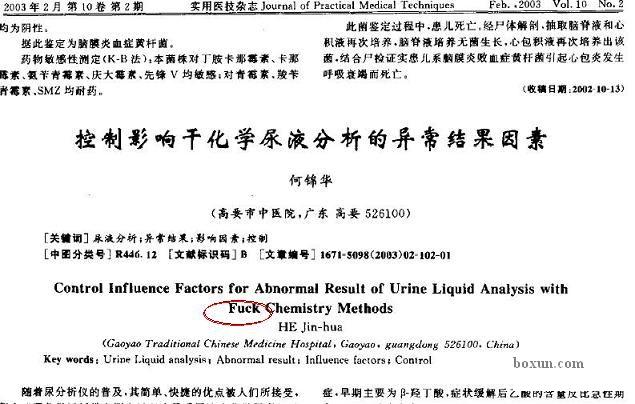
The Presidential Office received another threat against President Chen Shui-bian (
Lee said the e-mail, sent by someone describing themselves as the "black killer," contained threats to shoot the president with two bullets, kidnap his grandsons and sexually assault his daughter. Later yesterday, the Presidential Office made the content public.
Here is the actual text from "the killer in black clothing" (
黑衣殺手) (via UDN):砰砰ㄚ本甲林北蠟筆小新一點要不然賞您兩顆土豆強姦姓餘的梆架小ㄤㄤ輪椅ㄟ座了尚辛苦囉林北乎伊躺咧睏叉您老母。
The opposition is saying that this was another ruse manufactured by Chen Shui-bian for election purposes. Perhaps, but it was not concocted by senior officials because they are unlikely to be able to write "Martian" (see China Daily for an introduction to the 'language'). By comparison, here is the threatening letter to the President's son.
(Apple Daily editorial)
If I were Chen Shui-bian, I must be crying hard. How come when my son, daughter and myself received threats repeatedly, nobody offers me any sympathy? Instead, they heap scorn upon me. Why does everybody think that I fabricated this? How come even my American friends think that I am manipulating for the elections? How come nobody believes what I say?
We would like to ask the President: When the family of an ordinary citizen is threatened, they receive sympathy. As the President, you should have the trust and support of the people. Instead, you are treated as a joke and everything you say is regarded as farting. Why is that? As the President, you have lost the trust and respect of the people and your authority has disappeared. Even when you are threatened, nobody believes you. Why is that?
When the presidents of other nations receive threatening letters, they will turn them over to departments such as the Secret Services to handle. They will keep quiet in order not to create a stir and affect the presidential stature. This also gives no free publicity to the senders of the threatening letters. However, you do exactly the opposite and you make a loud public complaint as if you want everybody to know. This is bound to create suspicion that you want to use this threat to gain some sympathy and you want the voters to transfer the sympathy to DPP presidential candidate Frank Hsieh and the other DPP legislature candidates. Wrong! People do not believe that the threats against you are real and they will also regard Hsieh and the other DPP legislature candidates as co-conspirators in your lies.
The bankruptcy of your character is your own personal problem. But the bankruptcy of the character of the president becomes a problem for the people as a whole. That is why the responsibility of a leader is so huge. If you are honest and forthright, the people will love you and forgive you even if you are incompetent. Everybody will still be positive-thinking and content. But you happen to be deceptive and dishonest with a bag full of tricks. People are forced to guess at the motive every time that you speak, and they become depressed and negative-thinking. It is painful for those who don't trust you, for who wants to hold doubts about their state leader? Because of the painfulness of this, many people simply refuse to consider you as their president anymore and this relieves them of the emotional burden that you caused them.
In order to be trusted, you must first deserve the trust. You have been the president of one political party and you are always campaigning for your party. You do everything necessary to win. You have a bag full of cunning little tricks. You do things to attain temporary objectives. The net result is that people do not think that you deserve their trust anymore. Sometimes, your motive is good and you want to do something for Taiwan. But a good motive is not necessarily better than a pure motive. Your motives are too complicated and too impure, and this causes people to doubt your original good intentions.
In the future, please do not tell us about what you "want" to say. Instead, tell us what you "should" say. To do so, you need to start again on the basis of honesty and forthrightness.
(Apple Daily) Meanwhile, the other assassination topic of interest is the novel "The Story of the Assassination of Ma" (
刺 馬 記). This novel was published in September 2006. In the novel, a number of details have turned out to be true later on: the resignation of Ma Ying-jeou as KMT chairman on account of the special fees case; the threatening parcel sent to Taipei city mayor Hau Lung-bin; the threat against President Chen Shui-bian's daughter;etc.In the novel, on the final Saturday before the presidential election in March 2008, KMT presidential candidate Ma Ying-jeou traveled to Kaohsiung city to campaign and was shot three times in the abdomen. The injuries were not life-threatening.
(TVBS) When AIT chairman Raymond Burghardt came to visit recently, he met with KMT vice-president candidate Vincent Siew. During the meeting, Siew spoke about three foul plays by the DPP. Foul play #1: President Chen does not like his party's candidate Frank Hsieh, and so Hsieh will be assassinated in order to make way for Su Cheng-tseng to become the candidate. Foul play #2: On the 228 march or the 314 anti-Chinese-anti-splittism-law march, riots will occur that lead to imposition of emergency laws that will postpone the election. Foul play #3: Assassinate the KMT candidate.
Which is the novel? "The Story of the Assassination of Ma" or the TVBS news story?
This caused an unknown person to post a comment:
(in translation) The World Health Organization is WHO! Not WTO! This shows that this kind of hospital is definitely lying. So please be careful and do not be deceived!!! The relevant departments of Wuxi city should pay attention to this ad, and not let the image of Wuxi city be tarnished!
[in translation]
Recently, the Beijing city Haidian People's Court rendered a decision in the trial of Crown Press versus China Drama Publishing concerning the copyrights of Eileen Chang. The court determined that the defendant China Drama Publishers should cease its copyright violations and compensate the plaintiff to the amount of 255,000 yuan. For the first time ever, the court also unequivocally rejected the testimony by an expert witness.
The defendant China Drama Publishing published Eileen Chang's work <Remaining Notes> in February 2005. On March 16, 2005, China Drama Publishing submitted a report entitled <Concerning our publishing company's withdrawal of The Complete Works of Eileen Chang> to the General Administration of Press and Publications' Publishing Review Bureau and the State Office Against Pornography and Illegal Content. The report indicated that "our publishing company recently published <The Complete Works of Eileen Chang -- Rumors> (ISBN7-104-01979-0) ,<The Complete Works of Eileen Chang -- Legend> (ISBN 104-01980-4) and <The Complete Works of Eileen Chang -- Remaining Notes> (ISBN 104-01981-2) with 1,000 copies each. Due to the dispute over copyrights, our publishing company decided to terminate the printing and distribution of these books as well as recalling any copies already distributed. In order to prevent the damage of the rights of the copyright owners, we prepare this report to the Publication Review Bureau and the State Office Against Pornography and Illegal Content."
On September 9, 2005, China Drama Publishing issued an authorization to the Beijing Laosantang Cultural Limited Company for the latter to sell 1,400 copies of <Remaining Notes>.
During the trial, an outsider Jin Hongda was examined by the China Drama Publishing lawyers in the capacity of an independent expert on the works of Eileen Chang. The testimony of this expert was recorded, and he held the opinion that it was uncertain whether Crown Press had the rights of the works of Eileen Chang. But the court made an investigation and determined that Jin Hongda had previously used the name Zi Tong together with another non-defendant Yi Qing to publish the book <Addendum to the Collected Works of Eileen Chang> and drew an extraordinarily high payment in the names of "Eileen Chang, Zi Tong, Yi Qing and Zhou Fenling." The court held the opinion that when an expert witness testifies, the status should be that of a neutral person without any interest in the case itself. Through his deeds, Jin Hongda had a material interest in this case because the outcome of this case has a bearing on the legality of what Jin Honda and others had previously done. Therefore, the court refused to accept the expert witness status and opinions of Jin Hongda. Since China Drama Publishing could not offer sufficient evidence to refute the charge that they violated the plaintiff's copyrights, it should bear the consequences. The court therefore decided that the defendant must stop its copyright violations and compensate the plaintiff's economic losses to the amount of 255,000 yuan.
Afterwards, China Drama Publishing did not indicate whether the verdict would be appealed.
Note: The ESWN blogger also has a material interest in this case, as he is the executor of the literary estate of Eileen Chang.
The government's report on political reform has come under fire for its over-reliance on some opinion polls that were conducted through unprofessional means, a public-opinion expert says.Robert Chung Ting-yiu, director of the Public Opinion Programme of the University of Hong Kong, criticized the government's report for extensively quoting polls regardless of their methodology and professional standards.
Findings of several polling agencies were quoted in the report, including those conducted by the University of Hong Kong, the Institute of Asia-Pacific Studies of Chinese University, the Hong Kong Research Association and Ming Pao.
Controversial conclusions, including that 60 per cent accepted universal suffrage for the chief executive in 2017 if it could not be attained by 2012, and that more than half supported retaining functional-constituency seats, were mostly drawn from the polls conducted by the Hong Kong Research Association.
"I believe some of the polls quoted were done through unprofessional means like using interactive-voice-response technology, which is not a recognized method of professional opinion polling," Dr Chung said.
The Hong Kong Research Association confirmed yesterday that its survey was conducted by an interactive-voice-response system. The polling agency was founded in 2004 with Thomas So, a part-time member of the Central Policy Unit, as its chairman. He is the executive director of the Hong Kong New Generation Cultural Association.
The surveys carried out by the Public Opinion Programme, Chinese University and Lingnan University are conducted through real interviews by research assistants.
(SCMP) Tsang suggests universal suffrage in 2017. Lina Lim. December 12, 2007.
Hong Kong wants early universal suffrage but a 2017 implementation would have as good a chance of being accepted by the majority, Chief Executive Donald Tsang Yam-kuen told the central government in his constitutional development report on Wednesday. Mr Tsang was discussing the government’s universal suffrage blueprint in a special televised segment on state media.This came immediately after he had submitted to the central government a summarized report on the outcome of the green paper public consultation on constitutional development earlier this year. He said the report detailed the community’s expectation of a further democratized electoral system and its desire for early universal suffrage in accordance with the Basic Law. Mr Tsang added that he had advised the Standing Committee of the National People’s Congress (NPCSC) to allow Hong Kong to amend the methods for selecting its Chief Executive and for forming the Legislative Council in 2012.
He said the report detailed four main views which he had noted from the public consultation exercise. This included the community’s desire for early universal suffrage; the implementation of a revised electoral system for Chief Executive by 2012 and expectations that universal suffrage for the Chief Executive come before universal suffrage for the Legco election.
The Chief Executive noted that opinion polls had shown that implementing universal suffrage for the Chief Executive election first in 2012 was expected by more than half the public. “This expectation should be taken seriously, and given consideration,” he said, adding however, that a 2017 implementation would be more feasible. He also noted that a general consensus had emerged on implementing universal suffrage for the Chief Executive first, to be followed by universal suffrage for the Legco election. The report stated that a timetable for reform would definitely help in resolving many problems, although the government did not include one in its blueprint.
Here are the two major public opinion polls whose results have basically not shifted much over time.
(HKU POP)
Article 45 of Basic Law states that the method for selecting the Chief Executive shall be specified in the light of the actual situation in the HKSAR and in accordance with the principle of gradual and orderly progress. The ultimate aim is the selection of the Chief Executive by universal suffrage. If only given the following choices, which year would you prefer implementing the selection of CE by universal suffrage?
2012: 58%
2017: 27%
2022: 4%
2027: 4%
Don't know/hard to say: 8%Article 68 of Basic Law states that the method for forming the Legislative Council shall be specified in the light of the actual situation in the Hong Kong Special Administrative Region and in accordance with the principle of gradual and orderly progress. The ultimate aim is the election of all the members of the Legislative Council by universal suffrage. If only given the following choices, which year would you prefer implementing the selection of Legislative Councilors by universal suffrage?
2012: 64%
2016: 20%
2020: 4%
2024: 2%
2028: 3%
Don't know/hard to say: 7%(Hong Kong Institute of Asia-Pacific Studies, Chinese University of Hong Kong)
Which is the more appropriate year in which universal suffrage of the Chief Executive should be implemented?
2012: 47.5%
2017: 19.0%
After 2017: 16.5%
Don't know/hard to say: 16.9%If the Central government thinks that 2017 is better for universal suffrage in the Chief Executive election, will you accept it? [Base: Those who chose 2012 in the preceding question]
Completely unacceptable: 8.4%
Unacceptable: 29.6%
Acceptable: 53.5%
Very much acceptable: 1.7%
Don't know/hard to say: 6.8%Which is the more appropriate year in which universal suffrage for electing the Legislative Council should be implemented?
2012: 46.5%
2016: 17.7%
After 2016: 19.9%
Don't know/hard to say: 15.9%

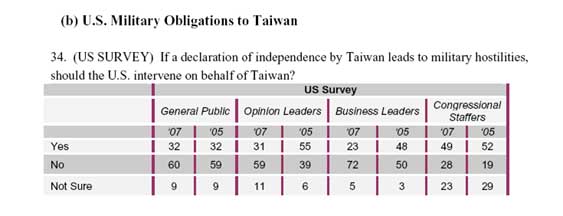
[in translation]
After their big defeat in the District Council elections last month, the pan-democrats suddenly saw how their opponents could organize and mobilize so powerfully. Another reason for the outcome was that the pro-government camp knew how the voting was going on an hourly basis. As a result, they could arrange to make emergency calls where needed. Hong Kong University Public Opinion Programme director Robert Chung has been involved in exit polls for 16 years. He usually selects a few key voting stations to poll voters on their way out. When the voting is finished, he could release the poll results to the public. But in the last 5 or 6 years, a number of unknown organizations started using massive manpower to conduct exit polls, and the data was released to specific political parties.
A democrat told this story. On election day, he exited the Shatin district voting station and someone immediately came up to ask him how he voted. He thought that this was the usual HKU POP poll and answered accordingly. Then he looked more carefully and saw that the person came from an organization known as the Hong Kong Community Research Centre.
This democrat went come and checked the Electoral Affairs Commission's website and found out that organizations (apart from Robert Chung's HKU POP) had applied to conduct polls outside almost every voting station. These organizations come under different names in different areas. For example, there was the Hong Kong Research Centre in Hong Kong Island; the Hong Kong Election Strategic Research Centre in southern Hong Kong Island; the Hong Kong Development Research Association in Kowloon; the Hong Kong Community Research Centre in New Territories East; the Social Affairs Research Association in New Territories West; the Community Research Association in Yuen Long and the outer islands.
According to informed sources, these research organizations have connections with the pro-government camp and they may even be providing their data. The main force appeared to be the Hong Kong Development Research Association in Kowloon West, in which a person named Tam there is also a vice-chairman of the Hong Kong Youth Development Association. The chairman of that association is the DAB winning candidate in the Yau Ma Ti district.
Yesterday, Robert Chung spoke about the district elections on Commercial Radio. He pointed out that these different organizations mobilized about 2,100 persons to conduct exit polls. By comparison, HKU POP sent out just over 20 persons. So the other side has more 80 times their manpower. HKU POP selected a sample of 27 voting stations to conduct exit polls. The other organizations covered 320 to 330 voting stations.
In the December 2 Hong Kong Island Legco by-election, there were 97 voting stations altogether. Robert Chung selected 40 of them. The Hong Kong Research Centre had people at every voting station.
These research organizations have not explained what they did with their research data. Robert Chung said that many of the exit poll data were given to specific candidates throughout the day. If those candidates use that data to make strategic election decision, it is unfair to the other candidates who do not have access to that information.
The pan-democrats do not have sufficient resources to do these types of exit polls. On the day of the Legco by-election, they used a crude method by recording the hourly voting totals. Then their headquarters compared the rate to the 2004 Legco elections and determine which districts require special attention to pump up the votes.
Two controversial incidents appear to have shaken public support for two ministers ...
According to one survey, public confidence level in Mr Wong has dropped by 9 percentage points, from 76 per cent to 67 per cent, the lowest in six months. Mr Wong, who usually enjoys high ratings, has been under fire recently for the Department of Justice's decision to prosecute Szeto Wah, chairman of the Hong Kong Alliance in Support of Patriotic Democratic Movements in China.
Critics have argued that the government has selectively prosecuted Szeto, who is charged with using unlicensed equipment when delivering a political message in Sai Yeung Choi Street, Mong Kok, on May 25. The 76-year-old retired legislator is an icon of the pro-democracy movement in Hong Kong and has vowed to go to jail rather than pay a fine if convicted.
Robert Chung Ting-yiu, director of the polling programme, said Mr Wong had not been involved in any major news except for the Szeto case. "Readers can make their own judgment."
The rating for Secretary for Home Affairs Tsang Tak-sing - who was criticised by pan-democrats last week for remarks he made about new legislator Anson Chan Fang On-sang - has also dropped. Mr Tsang has seen his public confidence rating dropping by 5 points, from 33 per cent to 28 per cent.
In Legco last Wednesday, when Mrs Chan gave her maiden speech, Mr Tsang said the former chief secretary was a person who had suddenly taken an interest in people's livelihoods and suggested her name be changed from "On-sang" to "Koon-sang" - using the Cantonese pronunciation of "officials' livelihood".
(HKU POP) First, let us look at Secretary for Home Affairs Tsang Tak-sing's numbers.
October 2-5, 2007: Have confidence, 30%; no confidence, 11%
November 5-9, 2007: Have confidence, 33%; no confidence, 13%
December 3-7, 2007: Have confidence, 28%; no confidence, 17%
The standard confidence index is to take (100 + %confidence - %(no confidence).
Tsang Tak-sing's confidence indices for the past 3 months are: 119, 120 and 111. So there is a significant drop this time. But more than 50% of the survey respondents don't know who Tsang Tak-sing or do not hold an opinion about him.
Next let us look at Secretary for Justice Wong Yan-lung's numbers.
August 6-10, 2007: Have confidence, 74%; no confidence 2%
September 4-7, 2007: Have confidence, 73%; no confidence 2%
October 2-5, 2007: Have confidence, 72%; no confidence 2%
November 5-9, 2007: Have confidence, 76%; no confidence 2%
December 3-7, 2007: Have confidence, 67%; no confidence 3%
Wong Yan-lung's confidence indices for the past five months are: 172, 171, 170, 174, 164. So there was a significant drop this time. But if the prosecution of Szeto Wah caused some people to turn against Wong Yan-lung, you would think that their opinions should turned into negative (that is, he loses 9% in confidence votes and adds 9% to the no-confidence votes). But his no-confidence vote hardly budged (2% to 3%). Instead 8% out of the 9% were converted into people who don't know Wong Yan-lung or do not hold an opinion about him. Why?
台灣民主紀念館 ) attracted hordes of tourists and curious onlookers at its opening yesterday morning. While the name change to "Liberty Square" (National Taiwan Democracy Memorial Hall (
(Apple Daily) Yesterday, Liberty Square was opened and hordes of people entered to take photographs, including newly weds. Taichung Third District's Legislature candidate Lin Chun-tung of the Liberal Democratic Party climbed up the stele in the plaza, took off his pants and urinated into a cup. He yelled: "At Liberty Square, you are at liberty to do whatever you want." Onlookers were astonished at the sight.
莊國榮) for his leadership in overseeing the project.Several Democratic Progressive Party lawmakers went to the ministry yesterday morning to commend Ministry of Education Secretary-General Chuang Kuo-jung (
Chuang has become a household name because of his snappy comebacks and caustic remarks about the Chinese Nationalist Party (KMT) and its top leaders, including calling presidential candidate Ma Ying-jeou (
馬英九) and Taipei Mayor Hau Lung-bin (郝龍斌) "sissies," "gay-like" and "wimps."(TVBS)
The DPP lawmakers went to the Ministry of Education in support of Chuang Kuo-jung, but a female heckler showed up uninvited and yelled: "Down with Ah Bian! Taiwan is finished! Taiwan is finished! ... I am trying to save my family, my children, my husband and my country. The people at the Ministry of Education are all trash." She yelled so forcefully that her dentures fell out.
The heckler had a backpack which was not zipped. So DPP lawmaker Wang Shu-hui reached in and took out the documents to start reading. Then she suddenly exclaimed: "This is a list of informants. Taiwan provided you with a good life. This is a list of shameless Communists!" When asked why she poked her hand into someone else's backpack, Wang said: "I was trying to help her. Her stuff was about to fall out."
(TVBS)
The pan-green camp is running on the basis of "removal of authoritarianism, transitional justice." Instead, DPP presidential candidate Frank Hsieh gets less exposure than a minor official from the Ministry of Education. Hsieh has been holding meetings to explain his proposed policies but who is paying attention? The Hsieh campaign spokesperson said: "Chuang Kuo-jung is neither a government spokesman nor a political campaign spokesperson. Therefore, we don't feel that people should pay too much attention to what he says." Hsieh said himself: "Please do not dance to his tune. Here we are talking about our ideas and we are speaking about livelihood and economic issues every day, but nobody is giving us airtime."
Famous sayings of Chuang Kuo-jung:
郝市長如果對這種事情不滿,我歡迎他隨時來告我,有種的話,他可以到法庭出庭,我會讓他哭著回去找媽媽! Translation: If mayor Hau Lung-bin is not happy about this, I welcome him to sue me anytime. If he has the guts, he can show up in court and I will send me back crying to this mama.! (YouTube)(TVBS)
(TVBS)
蔣經國是馬英九他媽媽,但對台灣絕大多數的人是,他媽再加一個『的』。 Translation: Chiang Ching-kuo is Ma Ying-jeou's mama. For the majority of the people in Taiwan, they say: "His mother's." (note: this is the abbreviation of the common curse: "Fuck his mother's cunt") (YouTube)(TVBS)
總統候選人最大的特徵是從小乖,那完蛋了!就像我有一些德國朋友來台灣,或我去在德國,他就跟我談到對台灣的政治現象,大家在聊,他們非常好奇,為什麼台灣的女生有些人很喜歡馬英九,德國人跟我說,就德國女人的觀點來看,馬英九很娘啊!不太像男人啊! Translation: When a presidential candidate's biggest characteristic is obedience since childhood, then it is over for him! When some of my German friends come to Taiwan, or when I go to Germany, we would chat about the politics in Taiwan. They are very curious: Why do these Taiwanese girls like Ma Ying-jeou? The Germans tell me that German women would regard Ma Ying-jeou as sissy! He does not look manly!(TVBS)
郝龍斌蠻熱愛蔣中正的,我看他跟他緊緊擁抱在一起,人家還以為是GAY勒,所以我覺得當他這麼熱愛蔣中正的時候,然後跟威權體制,這麼緊密唇齒相依的時候,我們就沒什麼指望! Translation: Hau Lung-bin loves Chiang Kai-shek dearly. I see that they embrace each other so tightly that people think they are gay. Therefore, I feel that when he loves Chiang Kai-shek so dearly and he follows the authoritarian system, we have no hope for Hau! 郝龍斌雖欠缺民主法治素養與獨裁者抱太緊,但有勇氣,勇於捍衛他所支持的事情。馬英九給我的感覺是『小孬孬』,就是一輩子恐怕不知什麼叫guts(膽識勇氣)、男子氣概和魄力,這一點他遠不如郝龍斌。 Translation: Although Hau Lung-bin does not have any sense of rule of law under democracy and he embraces dictatorship too closely, he has the courage to defend what he supports. Ma Ying-jeou gives me the feeling that he is "wimpy." He will never ever learn the meaning of 'guts' and the demeanor and charisma of a man. In this sense, he is far less a person than Hau Lung-bin.Archives